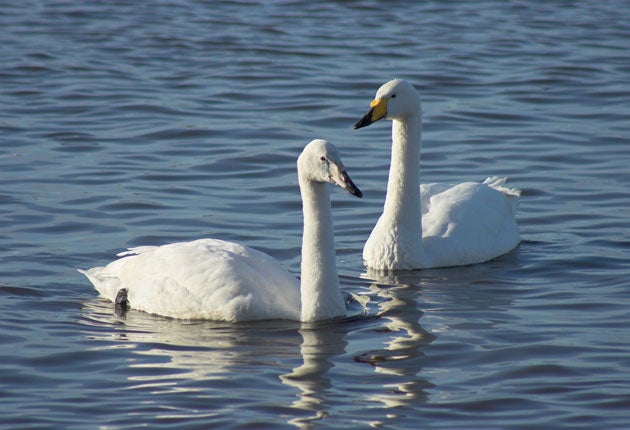Wild swans under threat as numbers begin to decline

Your support helps us to tell the story
From reproductive rights to climate change to Big Tech, The Independent is on the ground when the story is developing. Whether it's investigating the financials of Elon Musk's pro-Trump PAC or producing our latest documentary, 'The A Word', which shines a light on the American women fighting for reproductive rights, we know how important it is to parse out the facts from the messaging.
At such a critical moment in US history, we need reporters on the ground. Your donation allows us to keep sending journalists to speak to both sides of the story.
The Independent is trusted by Americans across the entire political spectrum. And unlike many other quality news outlets, we choose not to lock Americans out of our reporting and analysis with paywalls. We believe quality journalism should be available to everyone, paid for by those who can afford it.
Your support makes all the difference.Britain's two species of migratory wild swans, which come from the far north to spend the winter here and add grace and charm to many lakes and pools, are undergoing contrasting fortunes which are beginning to worry conservationists.
Both birds, the whooper swan and the Bewick's swan, are similar – being snow-white with yellow on their bills, in contrast to the orange-billed and more familiar mute swan which lives in Britain all year round.
But while numbers are soaring of the big whooper swan (pronounced "hooper"), which travels here from breeding grounds in Iceland, numbers of the smaller and straight-necked Bewick's swan, which migrates from the tundra of Arctic Russia, are dropping alarmingly.
Between 1995 and 2005, whooper swan numbers migrating south to Europe rose by nearly two-thirds from about 15,000 to more than 26,000, while in the same period numbers of Bewick's swans on winter migration to places such as Britain went down from 29,000 to about 21,000, a drop of about 27 per cent.
A Europe-wide wild swan census which is carried out every five years, most recently in 2010, is expected to confirm the trend when an analysis is published later this year.
Both species, which will soon be leaving Britain to go their separate ways back to Iceland and Siberia, are popular winter visitors on the nature reserves of the Wildfowl and Wetlands Trust (WWT). Scientists from the trust are undertaking research into the Bewick's swan's sharp population drop. There is concern about its conservation status as most European swan and goose populations are stable or increasing.
"We don't completely understand what's driving the decline of the Bewick's swan, but we are looking into it," said Julia Newph, the WWT swan research officer. "They might be facing several threats.
"We are quite worried about their breeding success on the Arctic Russian tundra. We do know that it is very strongly influenced by weather conditions, and we have found in the past that a combination of a warm spring followed by a return to freezing conditions in the incubation period is associated with breeding failure."
"We've seen this occurring more recently, and we need to investigate further whether this is the main thing driving the decline."
But there are other threats too, Ms Newph said, including illegal hunting. "The whooper swans' journey here is 800 miles, mainly over the sea, but the Bewick's swans' migration is 2,500 miles, mainly over the land, and crossing several political boundaries," she said. "There are opportunities for extensive illegal shooting of the birds."
Some 22 per cent of the Bewick's swans which have been X-rayed since 2002 at the WWT headquarters at Slimbridge, Gloucestershire, have been found to have lead shot in their bodies (the figure for whooper swans is 13 per cent).
Join our commenting forum
Join thought-provoking conversations, follow other Independent readers and see their replies
0Comments